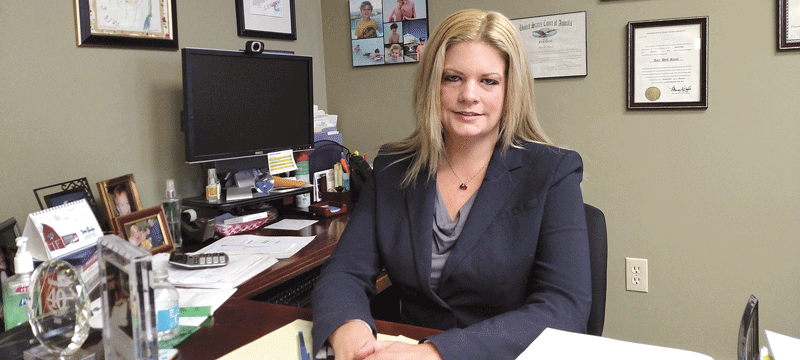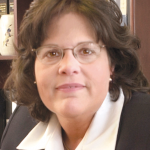Effective Law-firm Marketing Can Be a Public Service
Value-added Proposition

Amy Royal says her marketing strategy has long emphasized providing helpful resources through blogs, newsletters, and seminars.
There was a time when law firms simply didn’t advertise their services; it was considered unseemly. Those days are long gone, and marketing is now an accepted, even necessary part of the business. But for today’s practices, marketing goes well beyond print and radio ads. With the help of the Internet, firms are increasingly getting the word out by writing articles and blogs on important legal issues and connecting with the public through informational seminars — building credibility with the public and possibly creating clients down the road, but adding value for audiences in the meantime.
Generations ago, Michele Feinstein said, the legal profession’s code of ethics was simple when it came to promoting a law firm.
“It was, ‘thou shalt not advertise,’” said the shareholder attorney with Springfield-based Shatz, Schwartz & Fentin. “Then it changed, but it’s still a very regulated thing — the question of what constitutes appropriate advertising.”
To prove it, she dug out a thick volume of Massachusetts Supreme Judicial Court codes and eventually found the professional-conduct guidelines addressing marketing, or, to quote the section title, “Communications Concerning a Lawyer’s Services.”
This two-page-long rule governs appropriate outlets for advertising and what firms can and cannot promise in ads, among other minutiae. Feinstein is right: the rules are much more lenient today, with language conceding the importance of television and print media in reaching the public. But — aside from the more-strident messaging sometimes employed by personal-injury firms — it’s still an industry whose marketing echoes its restrained past.

Michele Feinstein
When I started my practice, we never thought about marketing. Certainly, they never tell you about that in law school. But the practice has had to evolve with the modern-day realities of how people meet and connect, and how they find and talk with their lawyers.”
That’s not to say there aren’t other ways to stand out, however.
“When I started my practice, we never thought about marketing. Certainly, they never tell you about that in law school,” Feinstein said. “But the practice has had to evolve with the modern-day realities of how people meet and connect, and how they find and talk with their lawyers.
“Certainly, word of mouth is important, but these days, the modern equivalent is the Internet: search engines, blogs, newsletters, and other forms of Internet presence,” she went on. “That technology didn’t exist 20 years ago.”
Shatz, Schwartz & Fentin has employed the Internet like many other area firms have: not only to get its name out, but to do so in a way that provides value to clients and the public, she explained, such as an online newsletter that focuses on estate planning and elder law, and a blog that addresses issues in myriad areas of the law. Traditional print media is useful too, she said, as seen in the articles the firm writes for BusinessWest and other outlets.
Amy Royal also sees the benefits of a multi-pronged approach to marketing. Her Northampton-based employment-law firm, Royal, P.C., hosts a robust blog; the firm’s attorneys contribute articles to area press outlets (including, again, BusinessWest); and they also conduct seminars and trainings for the public and fellow lawyers alike.
“We stay abreast of developments in the law, both on the federal and state side, and we tailor our trainings as well as our blog posts to making sure our clients stay up to date,” she said. “There are a lot of moving parts, a lot of change happening on the federal side, going to an entirely different administration … on any issue, we want to demonstrate credibility for perspective clients, so hopefully people say, ‘they’re experts in that area.’”
That credibility and recognition often translates into more business, a philosophy shared by Michael Gove, who launched the Gove Law Office, LLC, in Northampton in 2013.

Michael Gove
I think [our marketing efforts] ensure that we’re top of mind for people. Then, when someone has a legal issue, they may think of us, because they saw us recently in the paper, or online, or at a chamber event. We find we get referrals from those things.”
When it comes to marketing, he told BusinessWest, he has always focused on three areas: personal relationships with referral sources, trying to find reasons to be in the news as much as possible — for example, distributing press releases when the firm adds an attorney — and online marketing, which includes some paid advertising but more informational material, including a blog, providing resources to people who might then turn to Gove for legal services.
“I think it helps ensure that we’re top of mind for people,” he said. “Then, when someone has a legal issue, they may think of us, because they saw us recently in the paper, or online, or at a chamber event. We find we get referrals from those things.”
In a crowded market for law firms, those referrals and phone calls out of the blue are valuable, said the lawyers we spoke with about their marketing strategies. But laying the groundwork for that recognition doesn’t happen overnight.
Standing Out
Royal understands the importance of standing out in the Western Mass. legal community.
“There’s a lot of competition here in a small area; we’re saturated with lawyers in our region, and we have a law school here turning out new lawyers every year,” she said. “So what do you do to set yourself apart?”
The first step, she said, was focusing on a very specific niche — in her case, as a boutique firm that represents employers only — and building a brand around that niche in a number of ways.
“Our niche provides a natural focus for our marketing strategies,” she explained. “Because of our defined services, we’re not everything to everyone, and maybe that’s a recipe for failure — to be too generalized. We’ve really focused on our marketplace and focused on developing a strong, recognized brand with targeted, consistent messaging.”
That messaging takes both active and passive forms, she added. Passive outreach includes the blog, newsletters, seminars, social-media outreach, trade shows, and anything that establishes the firm’s expertise in its field without being an actual, traditional advertisement — something Royal has largely eschewed, though both her firm and Shatz, Schwartz & Fentin utilize BusinessWest as part of their marketing efforts each year.
“We don’t do passive marketing thinking we’re going to have a direct sale from it, necessarily, but just to build brand awareness in the community,” Royal explained. “Then, of course, we do active marketing, direct relationship building. That happens in a variety of ways: through community involvement, business events, networking events, where we zero in on who our target is.”
Feinstein agrees that outreach that amounts to sharing information with the public brings marketing benefits that may not be realized right away.
“We write articles, we give seminars where we speak to the public, we do advanced trainings for lawyers — quite a bit of that. We feel that these sorts of marketing efforts, if they don’t immediately create a client — though they may — they certainly, at minimum, give us secondary recognition. People see our blogs, read our articles, hear our name when we’re giving a talk, and later on, if they need a lawyer and ask around and our name comes up, it’s familiar.”
In fact, it’s impossible to tell when such efforts will result in client work, she said. Sometimes it’s the next day, and sometimes it’s years down the road, when someone comes in with materials they’ve been saving since the event, and now they need help.
“The fact that they also see we’re doing trainings for other lawyers, which we do a lot of, I think confirms, or enhances, the fact that we are knowledgeable in a particular area and are recognized by our peers as such.”
While passive marketing has its benefits, Gove said, he’s not averse to paid ads as well. Most of his efforts in this area are targeted at avvo.com, a website with a national reach. “It’s a way for people who need answers to legal questions find lawyers. We’ve found a lot of success there.”
As for more traditional media advertising, Gove said he plans more narrowly targeted messaging. As a bilingual firm, he wants to expand more into Spanish-speaking communities, so he intends to approach media outlets that have inroads in that population.
“But, really, the three main pillars to our marketing are personal relationships, getting in the news, and being visible online. We’re definitely not advertising in the Republican or in the yellow pages. It’s not like it was 20 years ago.”
That said, the strategy has largely paid off for this growing firm, which expanded with a second office in Ludlow in 2014. “I think we’ve done a good job of growing, by making sure we’re visible and helpful.”
Word Up
Feinstein also considers her firm’s various passive marketing efforts to be a form of help, of public service.
“All we’ve ever done — writing articles, whether for legal journals or the Reminder or BusinessWest; lecturing and giving talks; that kind of stuff — gets our name out, gets the word out, but it also provides value, and we feel like that comes back to you in one way or another. It doesn’t have to be a one-to-one correlation. That’s fine with us; we have an obligation to serve the public by providing information, which we take seriously.
“People appreciate the difference between that kind of marketing and some general slogan, like ‘call us and we’ll fight for you,’ or ‘we’ll take your case seriously,’” she went on. “We provide real information and something to think about, and if people have concerns, we tell them to see their advisor. Whether that advisor is us or someone else, we’re still providing value.”
The Supreme Judicial Court’s rules on advertising state that “questions of effectiveness and taste in advertising are matters of speculation and subjective judgment,” which is a far cry from “thou shalt not advertise.” But lawyers should take their messaging seriously, Royal said.
“A lot of law firms maybe don’t think of themselves as a business first, which they are; they think of themselves as practitioners first,” she told BusinessWest. “But we treat this law firm as a business and attack our marketing that way. What we’ve done has been very strategic from the beginning.”
Joseph Bednar can be reached at [email protected]




